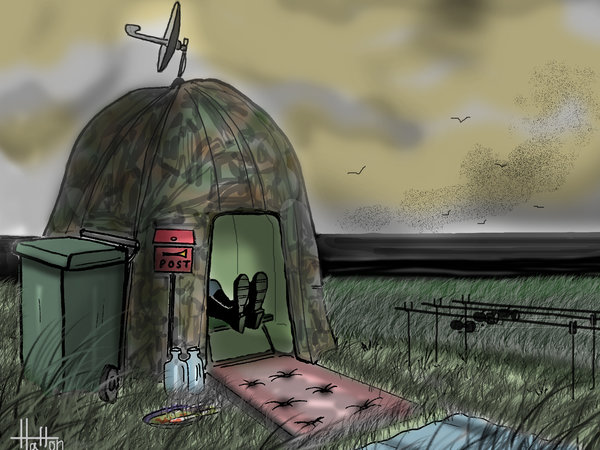Before moving 250 miles to the west I lived within easy distance of the Norfolk fens; Kings Lynn, say, was a round-trip of about 220 miles so a dawn to dusk day-trip was perfectly manageable and worthwhile on most occasions. It was here I spent the winter months to find my own version of ecstasy, but it wasn’t the size of the pike that drew me in (I only ever had one twenty pounder) but the lure of wilderness and the sense of a bygone age when solitude really did mean total isolation; where it would be just me against the elements. With my car an abandoned distant dot, fishing within a black and treeless wind-raked desert was exhilarating yet curiously worrying, alone with nothing but my thoughts and a few provisions. There was no one to turn to and no refuge; nothing suggestive of modernity and no sounds other than those of the lapwing and the wind. I think maybe this, too, was silent, any noise coming only from its search of my ear-holes and the hiss of yellowed grass.
A pair of floats shared my loneliness, exiled to their own friendless locale by the reeds, ducking in and out of view on the grey-chiselled drain. I’d flick constantly from one to the other through tearful eyes, sure of their imminent disappearance beneath the chop. Such vanishing tricks were rare enough to retain their value but frequent enough to keep me keyed-up and full of expectation. When that float rose and suddenly put its feet up, the wistfulness of times gone by and thoughts of absent family were cast to the wind – I’m in! Would it be the wriggle of a ratter or the awesome thump of a heavyweight? The question was asked every time and every time was as exciting as the last. That’s the joy of fishing: we don’t do pessimism.

Some fen-anglers value a few home comforts…
One particular trip though – to the Cut-Off near Feltwell – really did seem futile. You see, my brother and I cut our angling teeth on gin-clear pits where we learned how to spot the most cunningly hidden pike, but here, today, on this unruffled, crystal-clear drain we could see nothing. For a couple of hundred yards on either side of our station we slowly crept in search of fish, but the channel was evidently devoid of fish-life. After a midday bite to eat I decided to search for some kind of feature – anything that might constitute a novelty for pike bored out of their skulls. Such an oddity was eventually found a half-mile up or downstream – who knows? – in the shape of a fallen birch. Most of it was submerged, surely the Cut-Off Channel’s foremost attraction, and for one stupid second I imagined a team of enthusiastic jacks handing out complimentary entrance tickets to passers-by. But I quickly sobered-up and went back for my gear and my brother, in that order: he’d been snoozing and was undeserving of a share in my enterprise.
Thirty minutes later we each had a half-decent Esox in our landing nets and despite the abysmal quality of our limp, bedraggled dead-baits, the floats rarely hung around for more than a few minutes before taking another dive. We finished the day with thirteen fish including one of 18lb 4oz to my rod – and quite rightly so!
My book ‘All Wind & Water’ contains a cartoon of a pike angler jealously claiming a spot where a tall and distinctive weed is growing, but this really isn’t much of a joke! The slightest aberration in or on an otherwise featureless drain can make all the difference to a day’s fenland piking and there are many who can testify to this; indeed, FM would love to have their story.
At Floods Ferry I once had a pair of airborne swans rendered static and quite literally within my reach by the most powerful of headwinds; try as they might they were simply unable to gain the few extra feet to land on the Old Nene. The water was there, not a yard from their beaks, but their battle to drop onto the drain was thwarted by the fiercest icy wind. I approached them purely because I could, but my glasses were torn from my face and sent flying fifty rod-lengths into the field. The swans eventually conceded defeat by raising a wing and zooming back over my head like a couple of rockets. Few have seen such a sight.
There are sanctuaries in the fens: intimate, narrow drains which cut through scrubland blessed with an old bridge and the shelter of trees. These are the areas I like on those bright and frosty, breathless days when the Kelly refuses to fire-up; she will – eventually – but every brew is preceded by much huffing and puffing and the waste of much-needed newspaper. Once the twigs are crackling and a steady pall is rising into the blue, it is nothing less than ecstasy to sit back in the winter sunshine and await the kettle’s steamy, orgasmic shudder. If you don’t befriend a robin this day you never will.
And you might get a fish. The shyest of enquiries will tap out a clear message on the unruffled channel or, if you’re off-bottom, a determined grab will produce an audible ‘plop’ of the float. Such times are precious. You can shun city life in a cinema or escape from it all in a bar but you’ll always know that beyond that wall there’s a high street and a string of burger joints. But this is the real thing: you’re a soul within a boundless plain of expectant black tillage cut-through by endless channels; not a novelty you can exit through a door. Nothing changes as night creeps in, only the bickering of blackbirds and pheasant looking for a place to roost.










